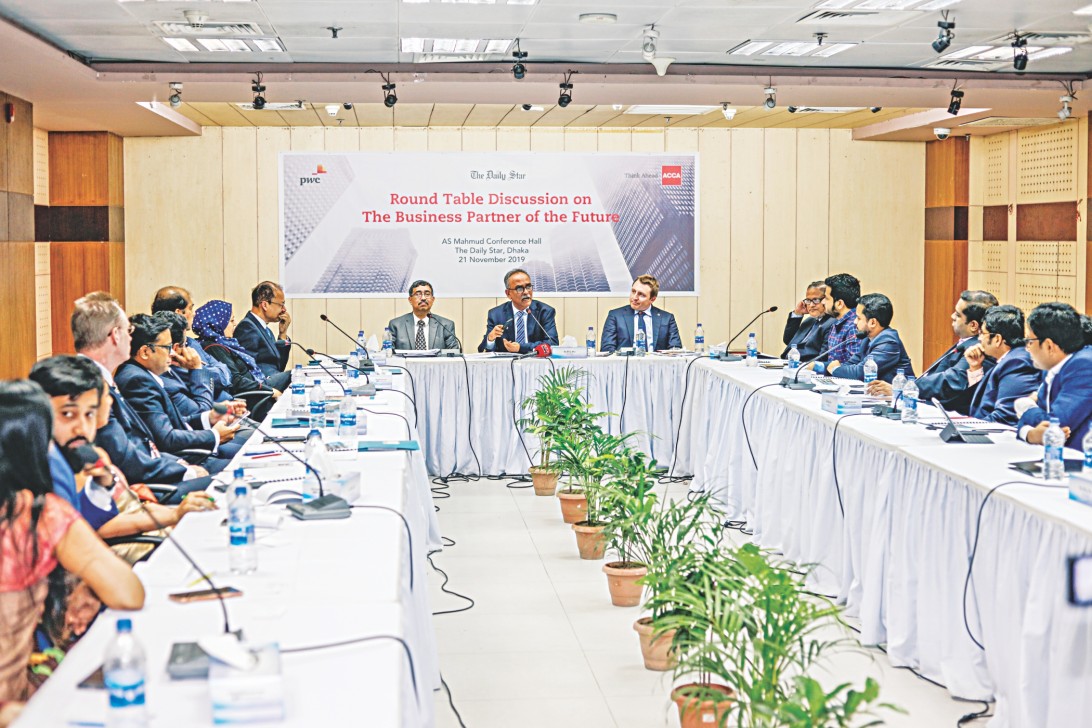Embrace new tech to stay relevant

Accounting professionals should embrace new technologies and upgrade their skills in order to stay relevant in the fast-changing world, understand and analyse data, and support companies in making informed decisions, analysts said yesterday.
“The fourth industrial revolution is coming such a big way and this is so impacting that you can’t hang on your own environment,” Comptroller and Auditor General Mohammad Muslim Chowdhury said.
“If you don’t align yourself to the changing world and develop your skills accordingly, you will be hanging in the balance with no ground under your feet,” he said.
The CAG made the comments at a roundtable styled “Business Partner of the Future” organised by the Association of Chartered Certified Accountants (ACCA) Bangladesh, PwC Bangladesh, and The Daily Star at The Daily Centre in Dhaka.
Chowdhury said the government and bureaucrats are gradually embracing technologies. He cited the example of the pension payment system and the subsidy payment system where the beneficiaries get the payments directly to their accounts without hassles.
The CAG, however, said there is a big gap in syllabus when it comes to understanding technologies, so the curriculum should be changed frequently to incorporate the changes.
Mamun Rashid, managing partner of PwC Bangladesh, said finance professionals could face the biggest impact due to technological advancements and artificial intelligence, followed by medical professionals.
So, finance professionals should improve their skills so that they can control businesses and analysis-based data providers, instead of staying as business managers, he said.
Masud Khan, chairman of GSK Bangladesh, said technology was changing like the faces of a storm. However, it is not created a scary situation, rather acted in an enabling way that could help add value, he said.
“Technologies are here to stay. So, if we remain traditional accountants, it will not work,” said Khan, also a former finance director of LafargeHolcim Bangladesh.
“The finance professionals should acquire soft skills and analytical efficiency.”
Oliver Gibbs, regional financial controller of the ACCA, said businesses want real time data analysis and technology would be helpful to this end.
He said finance professionals need to have skills to use technologies and analyse data.
Md Ahsanul Hoque Bashar, country manager of ACCA Bangladesh, said a wind of change in technology was already blowing. “So, we have to embrace it. Psychological change is needed to embrace new technologies.”
Uzma Chowdhury, director for finance of Pran-RFL Group, said the world was changing so fast that people needed to stay one step ahead of time. She said the world was currently generating data a million times faster than what was in the times of “our predecessors”.
“So, financial professionals will have to deliver information to users in a manner so that companies can take decision properly.”
Zahidul Islam Malita, chief financial officer and finance director of Unilever Bangladesh, said, “Technological changes would come faster than we think. So, we need to have appropriate skillsets to remain relevant.”
Finance professionals also need to use their brains and should be looking forward to the future to flourish in their professions, he said.
Shamim Al Mamun, CFO of LankaBangla Finance, said the finance department worked as a strategic partner to CEOs and helped them take decisions. Mustafa Alim Aolad, deputy CFO of Grameenphone, said accountants were seen as bureaucrats but they need to have a mindset to develop themselves and their skills in technology.
Zulfikar Rahman, head of finance and operations at NewsCred, said accounting professionals were no longer bookkeepers, they were more like project managers.
Accountants are going to be surrounded by technologies, he added.
Thomas Barry, director for finance of the International Centre for Diarrhoeal Disease Research, Bangladesh (icddr,b), said chief financial officers were like coaches because their chief executive officers took decision on the basis of the data coming from the CFOs.
The CFOs should advise the CEOs by analysing data, he said, adding that finance professionals should develop their skills and be more analytical.
Md Fuad Uddin Khan, associate director of PwC Bangladesh, said technology would help people accommodate big data. However, the final decisions should be taken by human beings. At the event, a report styled “Finance: A journey to the future”, which was jointly prepared by the PwC and ACCA, was also launched.
The report called the changing times an opportunity, not a threat.
“In seizing the opportunity, finance leaders need to ensure that their teams are aligned closely to the purpose of the organisation. They need to create a finance function that serves the organisation better in a constantly disrupted world.”
The report said the biggest barrier to have been discovered was the mindset change in leadership of the role of finance perhaps due to the differing perceptions of different generations.
The technological knowledge is key to establishing the future capability of finance.
“Technology is also not only about cost but also shows how it can assist to add value to the business which will be difficult without technology,” the report said.
Moreover, headcount reduction is a by-product of technology, not the objective, the report said. Furthermore, organisations need to reduce transaction processing activities using technology by optimising processes.
Iftekharul Bhuiyan, head of finance at Nielsen Bangladesh, and Sarwar Azam Khan, a former CFO of GSK Bangladesh, also spoke. Md Nafeez Al Tarik, CEO of Asian Tiger Capital Partners Asset Management, was present.
